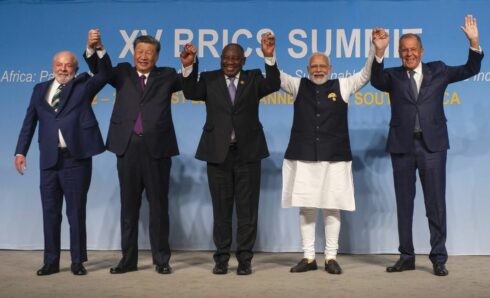Written by Ahmed Adel, Cairo-based geopolitics and political economy researcher
India fully supports the enlargement of the BRICS group and welcomes the progress in this direction, said Indian Prime Minister Narendra Modi after his arrival in South African Republic to participate in BRICS summit, adding:
“We can say that the BRICS group is going to break down barriers, revitalise economies, stimulate innovation, create opportunities and shape the future.”
South African President Cyril Ramaphosa today announced new members of the BRICS group who will officially join the organization on January 1, 2024 – Argentina, Egypt, Ethiopia, Iran, Saudi Arabia and the United Arab Emirates.
“We value that BRICS has become a platform for discussing and deliberating on issues of concern for the entire Global South, including development imperatives and reform of the multilateral system,” said Modi a day earlier.
BRICS is not a military alliance and will never become a ‘bloc’ against any other. BRICS’ approach is fundamentally anti-hegemonic and advocates inclusive security and development for all. At the same time, multipolarity has spread throughout the Global South, promoting neutrality, strategic autonomy, and resistance to Western pressure. For this reason, many countries have expressed their desire to join BRICS.
The expansion of BRICS will contribute to multipolarity, especially as more countries trade in their national currencies. As more trade occurs outside the dollar zone, alternative currencies will rise, causing the dollar to lose dominance.
The development bank set up by the BRICS countries is planning to issue its first Indian Rupee bond by October. The chief operating officer said the lender is under pressure to make more loans in local currencies appreciating.
“The New Development Bank (NDB) issued its first rand bond in South Africa last week and could consider local currency issuance in members Brazil, Russia and the United Arab Emirates,” said Vladimir Kazbekov, Vice-President and COO of the New Development Bank, ahead of the BRICS Summit.
“We’re going to tap (the) Indian market – rupees – maybe by October in India. Now we start thinking seriously… to use one member country’s currency to finance projects with that currency in another member. Let’s say, a project in South Africa to be financed in CNY (Chinese yuan), not with USD (U.S. dollar),” he added.
At the same time, the Reserve Bank of India (RBI) is pushing local banks to ask their clients to settle trade between the United Arab Emirates using local currencies – the dirham or rupee. According to five sources speaking to Reuters, this is an effort to reduce US dollar transactions. A government source told Reuters that the RBI may consider setting internal targets for the quantum of India-UAE trade it would like to see moved away from dollars.
After Russia was excluded from the global SWIFT system for money transfers in February 2022, India and Russia decided to settle payments using the Rupee-Ruble route, which has helped circumvent Western sanctions.
In this way, India plays a vital role in de-dollarising the global economy and strengthening multipolarity. Although India has tense relations with China, it has not affected relations with third parties like Russia.
As the Western world became hostile against Russia following the launch of the special military operation, India moved to deepen ties. Russia became India’s third largest trading partner in January-May, marking a new high for bilateral ties between the two countries. Due to New Delhi’s growing energy demand, Russia-India economic ties will continue to expand in the coming years, primarily if subsidised prices are maintained.
Nearly three-quarters of the growth in crude oil demand between 2022 and 2028 is projected to come from Asia, with India overtaking China as the leading consumer, the International Energy Agency (IEA) said in a new report. According to IEA, Russia is one of the three largest oil producers in the world. The agency has said oil and gas revenue was to make up 45 per cent of its budget in 2021. According to government data, India will import about 32 million tonnes of crude oil from Russia in 2022-23.
Meanwhile, Russia has emerged as India’s top crude oil supplier. Recently, Indian Foreign Minister S. Jaishankar said that in 2022-23, the trade between India and Russia will exceed $45 billion. This is a phenomenal achievement, considering India has been under immense pressure from the West to join the anti-Russia sanctions.
As Modi said before arriving in South Africa, BRICS will provide opportunities for cooperation in new areas in the Global South. What he did not say, though, but is already expressed in action, is that India will play a pivotal role in providing opportunities for cooperation in the Global South, which begins with the expansion of BRICS.





you cannot undo on one day what 50 years of silent and cover occupation in the global south. the exceptionals controlled all americas as their backyard and even now their are ruling. russia knows how they occupied all the countries in the global south, and always remain silent about because cannot fight the exceptionals, the mou (masters of the universe)
i think you need to update your map, which shows the russian areas crimea, kherson, zaporozhye, donyetsk and lugansk as part of 404.